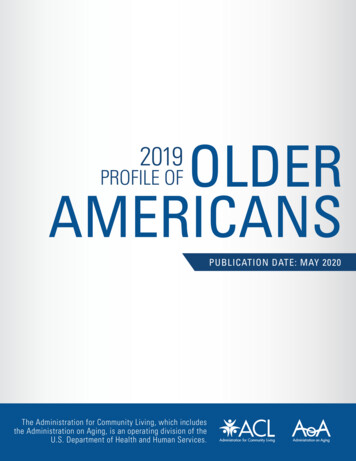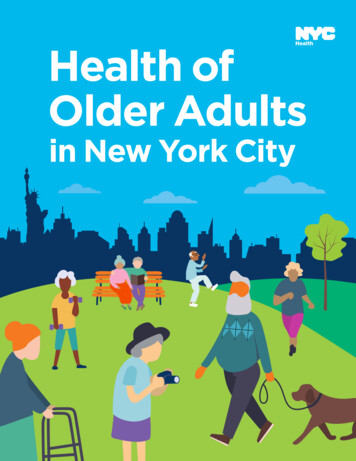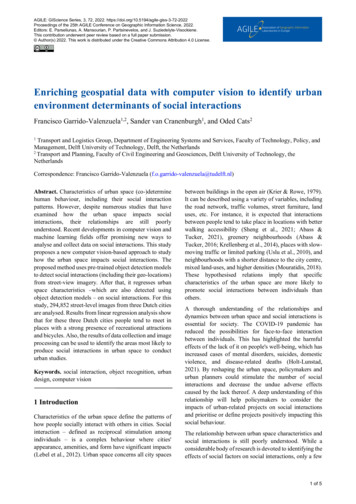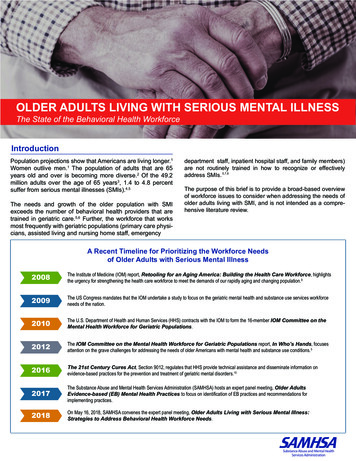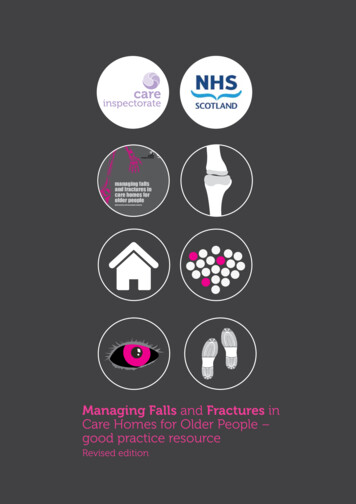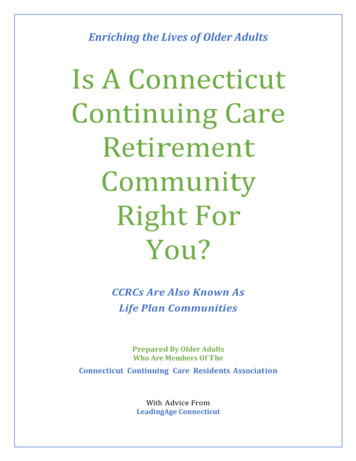
Transcription
Enriching the Lives of Older AdultsIs A ConnecticutContinuing CareRetirementCommunityRight ForYou?CCRCs Are Also Known AsLife Plan CommunitiesPrepared By Older AdultsWho Are Members Of TheConnecticut Continuing Care Residents AssociationWith Advice FromLeadingAge Connecticut
Enriching the Lives of Older AdultsVolume 2 / Updated January 28, 2020Editorial CommitteeGail Janensch, chair, Cecily Goodman, Carol B. Isaacs, Ute & Archie Holmes, Joseph WaltonThis publication is written and owned by Connecticut Continuing Care ResidentsAssociation. 2019 -2020 President John Johl, Essex Meadows.It updates Continuing Care Retirement Communities: A Guide Book For the ConnecticutConsumer, published by ConnCCRA in 2011.All rights reserved. This material may be freely copied and distributed for educationalpurposes only and this permission is subject to inclusion of this copyright notice.Ó Copyright January 28, 2019Photo credits and acknowledgements on final page of this publication.January 28, 20202
Is A Continuing Care Retirement Community Right For YouTable of ContentsPageWelcome Message.5What Do You Imagine a CCRC Is Like? .6Photos.7One Page Not to Miss.8History of Continuing Care Communities.9Financial Factors . 10Affordable?. 11Read Contract! . 12Types of Residential Contracts . 13Health Contracts . 14Living Unit Choices. 15Location and Grounds . 16Check List of Questions to Ask . 17Resident Rights . 18Connecticut CCRC Bill of Rights . 19January 28, 20203
Is A Continuing Care Retirement Community Right For YouWho Regulates CCRCs? . 20Healthcare On-Site. 21, 22Know Care Levels. 23List ofCommunities . 26Resources/Credits . 27January 28, 20204
Is A Continuing Care Retirement Community Right For You”We moved to continuing care after seeing how my Mom thrived for 14 yearsusing all three levels of care. My husband’s Dad died in his own bed in a house,but a house without a safe way to bathe and stairs to his bedroom so painful toclimb due to his spinal condition.”— Quote from a resident who helped with this Guide BookWelcome!Some Basics If You Are Thinking AheadAbout Life & Living Well To The Very EndDid you know that over 5,000 older adults in Connecticut live in a continuingcare community?The authors of this “Guide Book” may call their home a “CCRC” for short (itstands for Continuing Care Retirement Community). Others call theircommunities a “Life Plan Community.” Whatever the term, these are placesdesigned to provide services to help you grow older in place, with all thatyou may need, to make you feel safe and your families and friends lessconcerned about your status.The authors of this Guide Book live in such a place. We are not sales people.We just are one step ahead of where you may be, because we decided tomove into such a place. And we are members of Connecticut Continuing CareResidents Association (ConnCCRA), the organization that commissioned thisguide.Our aim is to provide you with important information to help you make aninformed decision as to whether a continuing care community inConnecticut is right for you. And, if so, which one? Currently 16 of 18communities in Connecticut meet the full definition of a CCRC.This Guide has sections on Financial Factors, Types of Housing, Levels ofHealthcare and many more practical tips.January 28, 20205
Is A Continuing Care Retirement Community Right For YouSee list of communities, locations & contact information (as of 2020),on last pages of this guide.What do you “imagine” a CCRC is like?The authors of this Guide Book would like to quote a recognized author and lecturer oncontinuing-care living before you read any of our “advice.” Brad Breeding’s nameappears in our list of references you will find at the end of this publication. Many of ushave heard him speak. His publications in book form and online are not onlyrecommended by the Connecticut Continuing Care Residents Association (ConnCCRA),but also by the National Continuing Care Residents Association (NaCCRA).“When you hear the phrase “retirement community,” what comes to mind?Perhaps you envision the nursing home your elderly parents orgrandparents were in, with people staring at a TV or eating off of cafeteriastyle trays. Or, maybe you think of “a bunch of old people” sitting around allday or playing bingo.If this is what you imagine I would recommend you take time to learn abouttoday’s retirement communities that offer a healthier and more holisticlifestyle than the alternatives. Many people have a negative preconception ofsenior living that may not match what is currently available in today’s CCRCmarketplace.”In Connecticut you will find some of the nation’s best managed communities.They are not static. They are listening, innovating and expanding.January 28, 20206
Is A Continuing Care Retirement Community Right For YouTake a look at someCCRC choices in oursmall state!January 28, 20207
Is A Continuing Care Retirement Community Right For YouJust Time For 1 Page? Read This . . .A Decision to Enter Continuing Care Is Unlike Any You Have Made Before! You areconsidering a life and financial decision that is different from choosing ahome/condo/rental.Why is the move into a CCRC unlike previous moves you have made? Here aresome “whys.”#1 Different because you cannot get a mortgage. You will be required to putdown a lump sum of cash for the entire cost of your unit, plus make monthlypayments for services.#2 Different because this decision likely is for the rest of your life!#3 Different because moving into continuing care will take some lifestyleadjustments. Downsizing. Your neighbors will be much closer, not across thestreet. And smoking may not be allowed even in your unit.P Visit several communities before deciding to move in!As you visit various CCRCs be alert as to how you “feel” about each one. Is itfor “you”?When you visit, do not just talk to the marketing people, ask to meetresidents as well. Most of these communities have guest rooms where youmay be able to spend one or two “trial” nights. At minimum, take theMarketing Department’s offer to arrange to have a meal in the diningroom with residents who may have similar interests. This can provide awonderful opportunity to find out what residents appreciate about theircommunity. And for you to ask questions. Ask many, many questions!P Find experts to give you advice before signing anything! An attorney. Afinancial advisor. Someone independent from the community you areconsidering.P See the Resources Section! There are print and online experts werecommend on Page 26.January 28, 20208
Is A Continuing Care Retirement Community Right For YouBRIEF HISTORY OFCCRCsHistoryAs early as the 1900s some religiousorganizations in the United States offereda precursor to today’s CCRCs. The conceptgrew in the 1960s and since the 1990s hasexpanded throughout much of the U.S.A.States such as Pennsylvania, California,Florida, New Jersey and Virginia have ahigher concentration of this form ofretirement living. In Connecticut, we haveseveral communities that have providedthis kind of living for more than 40 years.State of CT Definition of a CCRCContinuing Care Retirement Communities(CCRCs) are also sometimes referred to as“Life Plan” communities. Throughcontractual agreements, continuing-carecommunities provide residents with avariety of living accommodations andmany services, including long-term healthand nursing services.Various levels of care, generally starting atIndependent Living in residential apartments or cottages with the availability ofAssisted Living (offering help with dailyactivities) and Skilled Nursing, as neededare provided, on the campus.Each resident must enter into acontinuing-care contract with a CCRC inorder to obtain residency. Every residentis required to pay a substantial, lump-sumentrance fee and monthly fees in exchangefor housing and health-related services.These fees vary depending upon thecommunity, the type of living unit chosenand whether one or two individualsoccupy the unit.January 28, 2020Continuing-care communities havedifferent policies regarding theavailability and terms of entrance-feerefunds. Housing units can be apartmentsin high-rise or low-rise buildings,townhouses, garden apartments, cottagesor free-standing homes. Units can range insize from studios to three bedrooms.Residents are generally not entitled tohave equity in their units; instead, theyare entitled to use of their units inexchange for the fees they pay. CCRCs arenot licensed in Connecticut, but they mustregister with the Connecticut Departmentof Social Services (DSS). And adhere toChapter 319hh of Connecticut GeneralStatutes, Management of Continuing-CareFacilities. Various components of healthcare packages, however, are licensed bythe State of Connecticut. A 2015 provisionnow allows CCRCs residents to form anelected Resident Council.NEW TRENDS. . . More flexible meal plans are beingoffered in some communities. So ask. Second occupants of units may beother than a spouse. Ask about this onday one and in later years, could adifferent second person move in? Some communities are experimentingwith ways to bridge the jump fromyour current home to IndependentLiving in a continuing care community.In this “model” participation starts inyour own home with some servicesprovided. And you have limitedprivileges to come to the campus foruse of certain facilities. Or to dineoccasionally or attend events, forexample. All for a fee of course. Twomember communities are offering thisoption.9
Is A Continuing Care Retirement Community Right For YouFINANCIAL FACTORSThis Is An Investment Decision!Signing the contract to enter a continuingcare community is an investment decision,not just a housing or healthcare decision.This concept has been in Connecticut formore than 40 years. All CCRCs inConnecticut have survived the ups anddowns of business cycles, but in otherparts of the country, a few have failed. Youwant to learn about the financial “health”of communities you are considering.Investigate the community using tipsprovided here and from your own trustedsources. A prospective contract signer isadvised to first consult an attorney orother professional experienced inmatters relating to investments incontinuing care communities!Who Owns The Community?Who owns the facility is important toknow before you sign the contract. Is thecommunity that interests you owned by asingle entity or part of a chain of places inother states? Is it owned by a “for-profit”entity or a “non-profit?” Is it owned by areligious-affiliated entity? Among thefacilities in Connecticut more are nonprofits, but some have converted to forprofit status and new for-profit ones mayopen in our state.January 28, 2020Non-Profit or For-Profit?This factor really should not matter, but itdoes have some tax implications youshould be aware of. For instance, forprofits pay property taxes in thecommunity. Non-profits deal withobligations to the community underdifferent laws. This “for-profit or nonprofit” status may impact your own taxfilings. Learning the actual ownership of afor profit may be hard to determinebecause ownership may be by Real EstateInvestment Trusts, called REITs by theinvestment community. For-profitcommunities at present have no residentson Owner’s Board of Directors while somenon-profits do. This matter of residentrepresentation at the very top of acommunity’s management is currently adiscussion topic among residents of suchcommunities across the country.Initial Investment vs. Monthly FeesThe contract you will sign will have threebig parts: 1) The initial cash paymentdetails that will be a bigger or smalleramount based on the size/floor plan of theliving unit you choose AND are you oneperson moving in or two? 2) Thehealthcare plan you select; 3) Theschedule of monthly fees that will include(for example) fees for using a communitycar to take you to the doctor etc. The feesmay go up by a percentage most years,generally in January. By law yourcommunity must provide 30 days noticebefore fees are increased along with anexplanation and an opportunity fordialogue and comment. The lump-sumentrance fee cannot go up or down,because that dollar amount is somethingyou and management agreed to when youboth signed the contract.10
Is A Continuing Care Retirement Community Right For YouAFFORDABLE?What Management Will Ask of YouWhen you decide to sign a contract, youwill be questioned about your personalfinances to determine whether you havesufficient assets to put down plus tocontinue to meet the monthly service fee.Your assets and liabilities as well as yourinvestment portfolio, annuity andretirement income must be disclosed.Generally, you will be required to presentcopies of recent income tax returns andrecent bank and investment accountstatements. If you have long-term careinsurance, disclose that. You will berequired to make a deposit when yousign the contract. Many people rely onthe sale of their present home to meet theoutlay required by the total entry fee.Before moving in, any balance will bedue. Some communities may offer abridge loan so you can pay the balanceprior to the sale of your previous home orcondominium. Not all do.What If I Run Out of Money Later On?CCRC / Life Plan Communities do not wantto accept anyone who might run out ofmoney. Based on your financial disclosures, Management generally has theexperience to judge if you might run out ofmoney. But running out of money doeshappen. Management does work to find asolution with residents who findthemselves in this predicament. Somepeople do move away to a less expensiveplace or move in with a family memberoutside of the community when they nolonger can afford the CCRC. You should askwhat solutions to this problem areavailable before you sign the contract.January 28, 2020What Are Some Solutions?Some communities offer contracts thatpromise to never stop providing safehousing if money runs out. This may eitherbe in the community itself or in a sisterfacility nearby that is less expensive. If thecontract involves the right to a refund ofa portion of your entrance fee, somecommunities may permit the use of therefund amount to pay your monthlybills. Not all refundable contracts permitthis. Some communities have an “aid”program that can pay a portion of themonthly bill, but not 100 percent. Youmust apply to see if you qualify and tolearn how much will be offered. Do not beembarrassed to ask about these beforesigning the contract.What If I Need Assisted Living Or?Most of us cannot predict if we will needlevels of healthcare that are more costlythan Independent Living. You must askabout these costs before you sign thecontract. Keep in mind that Medicare plusyour Medigap insurance and medicaldeductions may lighten the burden in asmall way. But under most contractshigher levels of healthcare come withsignificantly higher costs. (See ContractTypes.) Your financial expert shouldclosely review this aspect of thecontract. Ask if aid programs offerassistance once you leave IndependentLiving for a higher level of care.11
Is A Continuing Care Retirement Community Right For YouREAD CONTRACTS!Get A Copy of the ContractYou are entitled to a copy of the contractfor review before signing. If you aredeciding between two places, obtain thecontract from each. These are longdocuments and can be overwhelming.Ideally you will have ample time to reviewthe documents yourself and by otherexperts you likely will hire. But if there isa waiting list for the type of unit you areseeking, yes, you will feel pressure. So lineup your potential advisors before youstart seriously visiting communities.Who Can Help You Understand theContract?The community’s Marketing Departmentwill go over the contract with you. Butlikely you would not make any decisionabout an investment of over 100,000without involving your family or trustedfriends. So go even further! Please seekappropriate professional help beyondthis guide booklet or family. Consult anattorney or other professionalexperienced in investments in CCRCs.Plan to spend time with experts beforeyou sign a contract.And see the Resources Section to learn ofbooks or websites specializing in CCRCs.January 28, 2020Are Contracts Difficult To Master, Yes!The straight answer is yes. The Marketingteam may not have explained every detail.But YOU must understand the wholecontract, including parts they might nothave emphasized. Having yourprofessionals looking out for yourinterests is a must!Nevertheless, in state required annualsurveys of residents, most people admitthey did not fully understand thecontracts they signed. But these surveysalso show that most residents are satisfiedwith communities chosen. People domove away. In Connecticut an annualConnCCRA survey of Independent Livingoccupants shows our communitiesmaintain close to 90 percent occupancyrates year over year. The contract spellsout how much, if any amount, you canrecover if you leave the community. Lookinto language about any refundableprovisions. Ask your attorney toexplain that part to you before signinga contract.Can Contracts Be Negotiated/Changed?Generally, contracts cannot be negotiated,but if the community has vacancies, whynot ask. Once signed, contracts are final.Reasonable cost-of-living increases tomonthly fees should be expected.Community ManagementThe contract may not tell you a lot aboutthe current management team. Youshould ask who the executive director isand how long has that person been in thatjob and in the community. Compare thiswith the Disclosure Statement. If keymanagement is new, follow up on this.Take Note of “No Tipping” LanguageEmployees likely are forbidden to accepttips of cash or goods for any reason.12
Is A Continuing Care Retirement Community Right For YouCONTRACT TYPESContracts Vary, So Study Them!Most continuing care communitiesrequire you to enter at the IndependentLiving level and then, as needed, you maytransition to Assisted Living Services orother care such as a Memory Services orSkilled Nursing. Not everyone uses allthree levels of care during one’s years inthe community. A current trend is toencourage residents to remain at theIndependent level made possible by hiringextra duty aides when needed. TheIndependent Living setting generally isthe most affordable level in a CCRC,depending perhaps on the size of the unityou have selected.Introduction to ContractsMost contracts cover five major topics andcommunities may offer you up to threehealthcare “types of contracts.” Types ofhealthcare contracts are discussed indetail on another page. This fact demonstrates why reading the contract andgetting financial advice is important.Five Key Contract Topics follow:1. Entrance Fee Amount DetailsThis section is straight-forwarddealing with the entrance fee amountfor your unit, plus a monthly fee. Ifthere are two of you, you likely willneed to pay a second person entrancefee and a second person monthly fee.This will include the type of healthcareyou will have while in IndependentLiving and the payment arrangementsshould you later need a higher level ofhealthcare.January 28, 20202. Fees for Services DetailsFor example, what meal plans areoffered. Or what will it cost to have thecommunity transport you to yourdoctor or the airport? Or what will itcost if you ask for extra services notcovered by your contract. Charges forservices may go up a certain amounteach year. Look through the contractfor the details showing fees. Ask aboutpast or pending increases in such fees.3. Financial Facts & Future PlansMany pages in the contract or in theDisclosure Statement are devoted toinformation about the owner of thecommunity, discussion of future plans,financial statements and protectionsavailable from the state.4. Meal PlansMost communities offer as part of yourmonthly fee 30/31 days of acontinental breakfast and a hot mainmeal in a dining room. Most also havea café open for hot food at breakfastand a variety of choices at lunch. Hoursvary. However, some communitiesnow are offering more meal-planchoices and café service into theevening in lieu of the full formal serveddinner. Ask about what dining choicesyou will be offered.13
Is A Continuing Care Retirement Community Right For You5. Healthcare Services At VariousLevels & CostsWhen you sign the contract, you alsowill sign up for the healthcare servicesthe community will offer you and thecost arrangements. The costs andservices differ among communitiesand your understanding thesedifferences is vital.HEALTH CONTRACTSThere Are Three TypesBe alert to the big differences in healthcoverage being offered by the communities you are considering. Are youcomparing “apples to apples “ or “applesto oranges”? Your out-of-pocket costsmight be significantly different dependingon what you choose and what actuallyhappens as you age in place. This decisionis a gamble.Type AThis is often called a life-care contract.You may pay a higher entrance fee and ahigher monthly fee. In exchange for this,you can live in the community for the restof your life and pay the same monthly feeeven if you move to the nursing level. Inshort, you are self-insuring against what itmay cost if you need higher medicalservices in Assisted Living, Memory Careor Skilled Nursing. Not all continuing carefacilities offer this contract type.Generally, the communities that dorequire a 90 percent refundablecomponent. Should you run out of money,Management may be able to apply fundsfrom the refundable amount to cover whatyou no longer can pay. Your communitylikely will offer a tax advisory letter inMarch for you to share with your taxpreparer who will help determine whatJanuary 28, 2020you may be able to deduct on Federalincome tax returns in light of current orchanges in tax laws.NOTE: If you live to the end of your lifenever using a higher level of care, this maynot be a wise choice. But there is no wayto know how your life will go. There arestudies that indicate that fewer than 20percent of those moving into IndependentLiving ever used Skilled Nursing services.But the costs if you do need a higher levelof care are significant. Check what privatehealth insurance coverage you have.Type BThis type of contract combines someaspects of fee for services and someguarantees of availability of AssistedLiving, Memory Care and Skilled Nursingif needed. This is done by discountinghigher levels of care for defined periods oftime, before market rates are charged.Some contracts offer refundable entryfees, but may be contingent upon theresale of your living unit. Your communitylikely will offer a tax advisory letter inMarch for you to share with your taxpreparer who will determine what youmay be able to deduct on Federal incometax returns.Type CThis type of contract is a plain “fee forservice” contract. If you need servicesaside from housing and amenities, youwill pay for the services you use at a“market” rate. So, if you eventually needAssisted Living, Memory Care or SkilledNursing, monthly fees will increasedramatically. If you have long-term careinsurance, this may make this kind ofcontract acceptable. Also, high net-worthindividuals may be okay with this plantype. Ask your tax preparer whether anyexpenses may be deductible.14
Is A Continuing Care Retirement Community Right For YouLIVING UNIT CHOICESSee Photos of All Housing Options!If you have access to a computer and theInternet you can learn much about theliving choices and services available. Thelist of communities in this guide have linksto websites where you can see apartmentfloor plans and photos of the dining room,the library, exercise rooms and so forth.The marketing staff will give you colorbrochures when you visit. When you visit,ask to see several floor plans. Ask the costof each.Main Building or a Cottage?Do you want the dining room andactivities just down hall or the elevator?Or are you OK with going outside rain orshine to get to the fun stuff or for breakfast or dinner? Not all communities havecottages. But be careful of making adecision with “love at first sight” thinking.What about five years from the present?Yes, it is possible to move within acommunity but it gets harder to do so asyou get older.What Floor Plans Are Offered &Available When You Want To Move In?Is there a waiting list for the living unityou want? How long? What does eachstyle and size cost? Think, will yourfurniture fit? Will you get the sunlight orshade you prefer? Will it be a long walk tothe dining facilities or to the mainentrance? Will new carpeting be installedand in what color? Same for paint choicesfor walls. What window treatments arepossible? Ask if the community offers (asan incentive to come) the services of aconsultant who will help you decide whatfurnishings to bring. Ask about door keysand policies regarding locking doors.Visit All Levels of Care!Even if you do not need Assisted Living orother levels of care, ask to visit these.Someday you or your partner might live atone of these levels.January 28, 202015
Is A Continuing Care Retirement Community Right For YouLOCATION / GROUNDSWhere Are You Willing to Relocate?Most of the CCRC/Life Plan Communitiesare in suburban or even “country”Connecticut. A few are in a city. Those in acity do have beautifully landscapedgrounds with walking paths and gardens.The others not only have gorgeousgrounds, but may be close to where you oryour families currently live. The statement“location, location, location” is key to yourthought process about where you want tolive out your remaining years.Use This List To Prioritize LocationsHere is a check list to help you prioritizewhat you want to be near:1. Family & friends?2. Hospitals?3. Doctor, dentist, specialists?4. Highways, airports, trains, buses?5. Golf, beach, tennis, major league sportvenues?6. Theaters, museums, music venues?7. Shopping, groceries, pharmacies?8. Cities like Boston, New York, Hartford?9. Other needs?Parking & Snow RemovalAsk where you will be parking your owncar if you are still driving and where yourguests will be able to park. Learn whatfees may be charged for covered parkingspots. Picture the entire campus whenthere will be heavy rain or snow. Whatsnow removal services will deal with localroads leading to your community andwithin the community including roadwaysand sidewalks? Will cars parked inoutdoor spaces be cleared off? If stillworking, will snow removal accommodateyour schedule?January 28, 2020Gardening & Outdoor Sports!When you make a visit to a community, becertain to ask for a tour of the grounds.Some have areas where residents cangarden and some may not. Are therehiking trails, putting greens, a relationshipto a nearby golf course, bocce courts,ponds?Pet(s): Yours & Other ResidentsHow many dogs or cats or other animalsare permitted? What other animal typesare allowed? What are the rules regardingservice dogs? Is there a charge for havinga pet? Any size limitations? Where willyou be allowed to walk your dog and therules regarding clean ups? What are theleash rules? What areas of the buildingsare dogs not permitted? In bad snow falls,will staff make it possible for you to getsafely to the outdoor pet walking areas?What are procedures for registeringcomplaints about pet behavior?Outdoor & Indoor SecurityAsk about security at the entrance to thecommunity, about when main doors arelocked and how one gets in. And whathappens if you do not come out of yourunit in the morning? Does anyone check?16
Is A Continuing Care Retirement Community Right For YouCheck List to Ask AboutPersonal Considerations24-hour SecurityBasic UtilitiesBasic TV/PhoneSafety Pendant/WristbandInternet/WiFiHousekeepingParking Yourself/GuestTransportation to doctor/Shopping/ChurchMeal accommodations forReligion or dietary reasonsHearing Loop in AuditoriumSnow RemovalPet FriendlyWheel Chair TransportVisually-impaired SupportHandrails in bath areasPodiatrist AvailableSupport Groups For Hearing etc.Ways to Support CharitiesCommunity AmenitiesBank or ATMCafé Hours/DaysLibraryVending MachinesComputer Room & HelpSwimming Pool/Whirl PoolAuditorium/Piano/ProjectionGift ShopConvenience StoreGardening/GreenhouseWoodworking ShopTransportation to cultural eventsEntertainment/Lectures/ConcertsFull-Service Dining RoomPrivate Party Dining RoomWine or Full-Service BarClubs: Men’s, Book, Welcoming, KnittingTransport to Airport/Train StationsLife-Long Learning ClassesReligious Services/ChaplainHealthcare On SiteWellness / BP Clinic24-hour Emergency ServicePhysical Therapy ServicesVisiting PodiatristOrthopedic Product VendorsPersonal TrainersDietician ServicesPersonal Certified Nursing Assistant (CNA) ServicesJanuary 28, 202017
Is A Continuing Care Retirement Community Right For YouRESIDENT RIGHTSYes, Older Adults Always Have RightsWhen you move into a continuing carecommunity you bring with you certainfederal and state legal protecti
down a lump sum of cash for the entire cost of your unit, plus make monthly payments for services. #2 Different because this decision likely is for the rest of your life! #3 Different because moving into continuing care will take some lifestyle adjustments. Downsizing. Your




